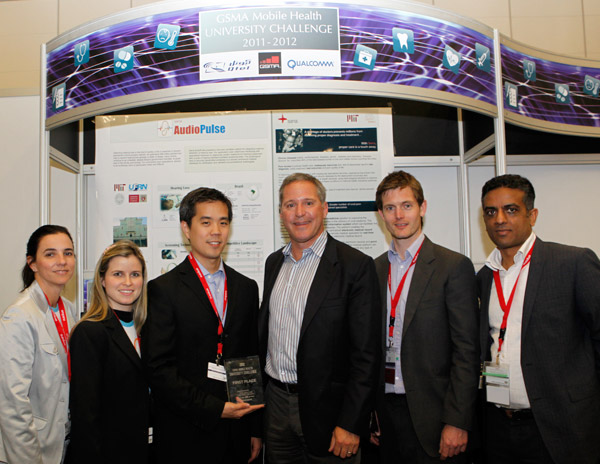Wednesday 30 May 2012
GSMA Mobile Health University Challenge – WINNER ANNOUNCED
Congratulations to the winner of the 2012 GSMA Mobile Health University Challenge: Massachusetts Institute of Technology (US) and Federal University of Rio Grande Do Norte (Brazil) with their innovation Sana AudioPulse.
Read more on Mobile Health Live

Team members with Clint McClellan, Qualcomm Life (centre) Richard Cockle, GSMA, & Irfan Goandal, Qtel
Tuesday 29 May 2012
Top Universities from around the world are currently battling it out in the GSMA Mobile Health University Challenge being judged at GSMA-mHealth Alliance Mobile Health Summit in Cape Town.
Four finalists just announced:
BabeeMon, University of Oxford (UK)
www.ibme.ox.ac.uk
Continuous monitoring of newborns particularly preterm babies and severely ill infants provides critical information about their health. Early detection of abnormalities such as changes in respiration, heart rhythm, and blood oxygen saturation and immediate action prior to the onset of complications may have a crucial impact on infants’ survival and their future development. This project leverages the existing mobile devices and mobile networks to provide a low cost neonatal monitoring system. The system includes health monitoring sensors connected to a mobile phone application with advanced signal processing techniques to analyse and notify the abnormalities in the monitored data.
LifeCheck, UC Berkeley (US)
www.lifecheckapp.com
Our mission is to guard health care from human error through the use of simple checklists. LifeCheck is a checklist management system for hospitals. Our application addresses the problem of preventable errors referred to as never events. LifeCheck offers a mobile client supported by a website, where surgery and department specific checklists can be created and deployed. Digital checklists feature advantages such as redundancy and fail safe mechanisms. Opportunities to reduce errors can emerge when hospitals are able to quantitatively identify root causes of errors, freeing health care professionals to do their jobs effectively and efficiently.
Snore Detector, Jordan University of Science and Technology (Jordan)
www.just.edu.jo
Snore Detector is a smart phone application used for detecting and monitoring snoring for Obstructive Sleep Apnea Syndrome (OSAS) Patients. Snoring is the main symptom which sleep specialists use to determine if the individual has OSA. Besides simply recording the voices coming from the patient while sleeping, the system uses Signal Processing and Artificial Intelligence methods to automatically detect snoring to help determining OSAS.
Sana AudioPulse, Massachusetts Institute of Technology (US) and Federal University of Rio Grande Do Norte (Brazil)
www.mit.edu
An estimated 588 million globally have hearing loss. In Brazil, federal law mandates hearing tests be performed during the first week of life. However, an estimated 5.7 million Brazilians (including 6% of children younger than three) have some degree of hearing loss. For populations living in poor and/or distant areas, access to a clinic is difficult and costly. Using Sana technology, we are developing an open source software using cell phones to screen for hearing impairment with a battery of hearing screening tests. Data will be transmitted securely and wirelessly to a centralized medical database for audiologist validation.